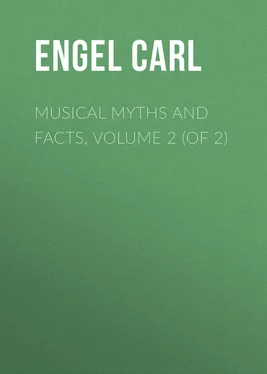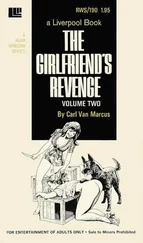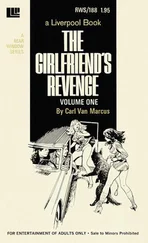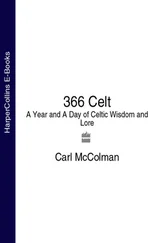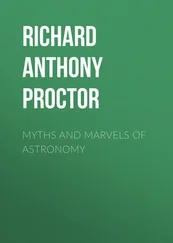Carl Engel - Musical Myths and Facts, Volume 2 (of 2)
Здесь есть возможность читать онлайн «Carl Engel - Musical Myths and Facts, Volume 2 (of 2)» — ознакомительный отрывок электронной книги совершенно бесплатно, а после прочтения отрывка купить полную версию. В некоторых случаях можно слушать аудио, скачать через торрент в формате fb2 и присутствует краткое содержание. Жанр: music_dancing, foreign_antique, foreign_prose, на английском языке. Описание произведения, (предисловие) а так же отзывы посетителей доступны на портале библиотеки ЛибКат.
- Название:Musical Myths and Facts, Volume 2 (of 2)
- Автор:
- Жанр:
- Год:неизвестен
- ISBN:нет данных
- Рейтинг книги:5 / 5. Голосов: 1
-
Избранное:Добавить в избранное
- Отзывы:
-
Ваша оценка:
- 100
- 1
- 2
- 3
- 4
- 5
Musical Myths and Facts, Volume 2 (of 2): краткое содержание, описание и аннотация
Предлагаем к чтению аннотацию, описание, краткое содержание или предисловие (зависит от того, что написал сам автор книги «Musical Myths and Facts, Volume 2 (of 2)»). Если вы не нашли необходимую информацию о книге — напишите в комментариях, мы постараемся отыскать её.
Musical Myths and Facts, Volume 2 (of 2) — читать онлайн ознакомительный отрывок
Ниже представлен текст книги, разбитый по страницам. Система сохранения места последней прочитанной страницы, позволяет с удобством читать онлайн бесплатно книгу «Musical Myths and Facts, Volume 2 (of 2)», без необходимости каждый раз заново искать на чём Вы остановились. Поставьте закладку, и сможете в любой момент перейти на страницу, на которой закончили чтение.
Интервал:
Закладка:
Mattheson. "He calls the Germans phlegmatic, and a querelle allemande does not occur to him."
Mainwaring (P. 35). "For, determined to make Handel pay dear for his priority, he stifled his rage for the present, only to wait an opportunity to give it full vent. As they were coming out of the orchestra, he made a push at him with a sword, which, being aimed full at his heart, would for ever have removed him from the office he had usurped, but for the friendly Score which he accidentally carried in his bosom; and through which to have forced it, would have demanded all the might of Ajax himself. Had this happened in the early ages, not a mortal but would have been persuaded that Apollo himself had interposed to preserve him, in the form of a music-book. From the circumstances which are related of this affair, it has more the appearance of an assassination than of a rencounter; if the latter, one of Handel's years might well be wanting the courage, or the skill, to defend himself; if the former, supposing him capable of making a defence, he could not be prepared for it. How many great men, in the very dawning of their glory have been planted, like him, on the very verge of destruction! as if Fortune, jealous of Nature, made a show of sacrificing her noblest productions only to remind her of that supremacy to which she aspires. Whatever might be the merits of the quarrel at first," —
Mattheson. "Here I must again interrupt the subtle reasoner, in order to show him his confusion, which is even greater and ruder than the preceding one, since that contained only above a dozen falsehoods, while we have here double the number. The cause of the quarrel was, indeed, quite different from what is here related. It was already mentioned long since, with all possible modesty, in the 'Ehrenpforte,' p. 94 and 193; but there was then no occasion, as there is now, to remind the reader that a cool box on the ear is no assassination, but rather a necessary warning to prepare for defence. This settles the first statement. The incorrectly-informed author relates a fable rather than a true event. Never, so long as can be remembered, have two harpsichords been played together in the orchestra of the opera in Hamburg at the same time; and as there has always been but one, a dispute about it, as narrated, could not possibly have occurred. Now, as to this dispute is attributed the origin of the fight, the remainder of the invention falls with it to the ground. There we have the second blunder. Subsequently erroneous statements are so frequent that it is scarcely possible to count them. Handel, in the beginning, played only the second violin in the orchestra; and he was, as may easily be conceived, not a more accomplished performer on that instrument than any other member of the orchestra. There we have the third falsehood, which is besides a boasting untruth. The fray occurred on the 5th of December, 1704. Handel, whom the biographer insists, as much as is in his power, on making younger the older he grows, was nearly twenty-one years of age, 11 11 He was not quite twenty years old.
tall, strong, broad, and vigorous in body; he was, consequently, man enough to defend himself, and to make use of the sword which he had hanging at his side. That is the fourth point, and a strong one too, which a writer very sensitive of his reputation should especially bear in mind when he, instead of recording real facts, indulges in high-flown laudations, and occasions the translator much unnecessary trouble."
Mainwaring (P. 37). "Whatever might be the merits of the quarrel at first, Handel seemed now to have purchased his title to precedence by the dangers he had incurred to support it. What he and his friends expected, soon happened. From conducting the performance, he became composer of the opera. Keiser, from his unhappy situation, could no longer supply the manager, who therefore applied to Handel, and furnished him with a drama to set. The name of it was Almira, and this was the first opera which he made. The success of it was so great that it ran for thirty nights without interruption. He was at this time not much above fourteen; before he was fifteen he made a second, entitled Florinda; and soon after, a third, called Nerone; which were heard with the same applause."
Mattheson. "The fifth brag, as to a certain opera having been performed in Hamburg, with every advantage and good result, thirty times without intermission, is surely not worth mentioning. The sixth, however, is even still finer. Let us just analyze it a little. 'Almira' was performed the first time on the 8th of January, anno 1705. Now, our chronologist counts from the 24th of February, 1684, when Handel was born, until the 8th of January, 1705, as a little more than fourteen years, while the period really is nearly twenty-one years. 12 12 See the note above, page 11 .
But he is not particular about seven years. A fine arithmetician, to be sure! Mistake No. 7. 'Nero' was not the third of Handel's operas, as our author erroneously states (mistake No. 8), but the second; and it was performed for the first time on the 25th of February, in 1705. Thus, there were only forty-eight days between the two performances; at the utmost, seven weeks. In the seven weeks there were seven Sundays, seven Saturdays, fourteen post-days, not to count the St. Mary-days and the holydays. How is it then possible that the 'Almira' could have been represented thirty times without interruption? Whoever believes only half of what this historicus here writes, believes too much. That was mistake No. 9. The tenth concerns the Florindo as a man, not the Florinda as a female. Handel's opera called 'Florindo' was not his second, but his third; and it was performed in 1708, three years after 'Nero.' Meanwhile, Keiser had not only composed a new 'Almira,' as well as the operas 'Octavia,' 'Lucretia,' 'Fedelta coronata,' 'Masagnello furioso,' 'Sueno,' 'Genio di Holsatia,' 'Carnival of Venice;' but also Schieferdecker had brought out his 'Justin'; Grünwald, his 'Germanicum;' and Graupner his 'Dido.' In the year 1708, Handel produced another opera, called 'Daphne,' which was the fourth of those he wrote for Hamburg, and which appears to be unknown to his biographer, as he omits it entirely. Has the man not had trustworthy sources for information? 13 13 Mainwaring had probably obtained some of his information from Handel himself; but he may have forgotten the dates, or Handel may not have remembered them exactly.
Howbeit, the dozen mistakes is complete, and we merely remark in addition, that in 1708 Handel was not 15 years of age, but quite 24. This error calculi may be regarded as a master stroke. Did we not know with certainty that George Frederick Handel died anno 1759, on the fourteenth of April, at the age of 76, 14 14 Handel was 74 years old when he died.
and we had to rely upon this blundering prosaic Homer for information respecting our musical Achilles, he would have remained constantly fifteen years, perhaps even imberbis until he came to the grave, and our barber in Hamburg, who every alternate day attended him, during five or six years, would have gained his money wrongfully. If an Englishman thinks that he can entertain us with his dreams in his mixture-language, he must be prepared for an answer from us in our heroic language. We understand him well, and have learnt his tongue; if he does not understand us, he may still learn this too… Having observed Handel during his sojourn in Hamburg, we leave the celebrated man to the Italians and the English; but we do not believe that the moon is made of green cheese."
Mainwaring (P. 42). "Four or five years had elapsed from the time of his coming to Hamburg to that of his leaving it."
Mattheson. "Should say five or six."
Читать дальшеИнтервал:
Закладка:
Похожие книги на «Musical Myths and Facts, Volume 2 (of 2)»
Представляем Вашему вниманию похожие книги на «Musical Myths and Facts, Volume 2 (of 2)» списком для выбора. Мы отобрали схожую по названию и смыслу литературу в надежде предоставить читателям больше вариантов отыскать новые, интересные, ещё непрочитанные произведения.
Обсуждение, отзывы о книге «Musical Myths and Facts, Volume 2 (of 2)» и просто собственные мнения читателей. Оставьте ваши комментарии, напишите, что Вы думаете о произведении, его смысле или главных героях. Укажите что конкретно понравилось, а что нет, и почему Вы так считаете.
